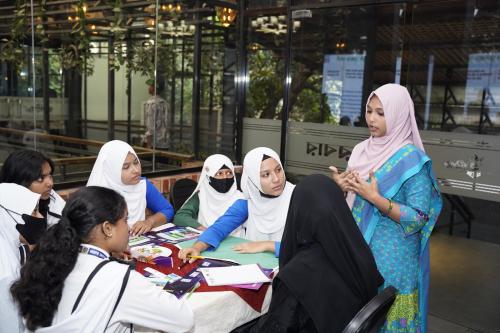Research shows that women who have control over the household resources are more likely to spend it on the welfare of the family, specifically investing in food and the education of their children. This is particularly true for those living in poverty and in marginal areas.
In the Yucatan Peninsula southeast Mexico, a number of Maya women group together to work in microbusiness cooperatives as an additional source of income. These initiatives are highly needed in indigenous communities located in isolated regions since the low levels of education in these rural villages do not allow them to compete fairly in the labor market. This is especially true for adult women, most of whom have not completed primary education.
For microbusiness cooperatives to have a real impact not only on women but the development of their families—especially girls—my research findings suggest that there are three key elements of success that should be taken in consideration when working with groups of indigenous Maya women to increase the sustainability of initiatives: social capital, follow-up activities, and ethical leadership.
First, it is important to financially support groups of women that are composed of friendships and/or families, since it is more likely that they will stay together as they face the challenges of operating a microbusiness cooperative. This value based on trust is also known as social capital, or a support network among community members. Social capital helps women confront the difficulties they face in relation to poverty, the migration of their husbands and sons due to labor reasons, and the gender inequalities that persist in these indigenous communities.
Second, follow-up activities carried out by representatives of the organizations that financially supported these initiatives is an excellent opportunity to provide additional guidance to women to grow the business over the time and foster their entrepreneurial skills, instead of being a monitoring activity merely to verify the efficient use of resources. Despite this, there are language barriers and I recommend that follow-up activities and training be conducted in their mother tongue, the Maya, the primary language in remote Maya villages. This will better facilitate the channels of communication and assure a full understanding between the representatives and the women.
Third, the presence of ethical leadership among entrepreneurial women will favor the sustainability of a microbusiness cooperative over time. As Albert Bandura stated, human beings modify their behavior to adapt socially; using this theoretical approach, ethical behavior is promoted and subsequently permeates inside the cooperative, among business partners, and clients. This is an alternative to doing business that is based on honest work.
In my book Enhancing Maya women’s development through cooperative associations: What factors support or restrict the contribution of cooperatives? I find that once a cooperative microbusiness is sustainable, Maya women invest their gain to support their children to achieve higher levels of schooling, especially with girls. Based on my nearly 90 interviews with Maya women, they understand first-hand the gender norms present in these rural communities that favor boys over girls. In other research, Understanding Girls’ Education in Indigenous Maya Communities in the Yucatan Peninsula, I demonstrate the important role and influence that mothers have in the educational development of their girls. Therefore, they may be more likely to invest in their daughter’s education when they have the financial means to do so, as one of the women said, “I’m working to help them with their school’s expenses, so they can have a better future.”
Following these recommendations will increase life opportunities not only for women but also for their daughters. Women’s empowerment through education and participation in economic activities reflects the value of self-sufficiency. This is an essential step towards human development based on effort and honest practices, which fosters respect towards women in communities traditionally ruled by patriarchal structures.
The Brookings Institution is committed to quality, independence, and impact.
We are supported by a diverse array of funders. In line with our values and policies, each Brookings publication represents the sole views of its author(s).






Commentary
Investing in women’s entrepreneurship creates educational opportunities for girls in Mexico
May 16, 2018